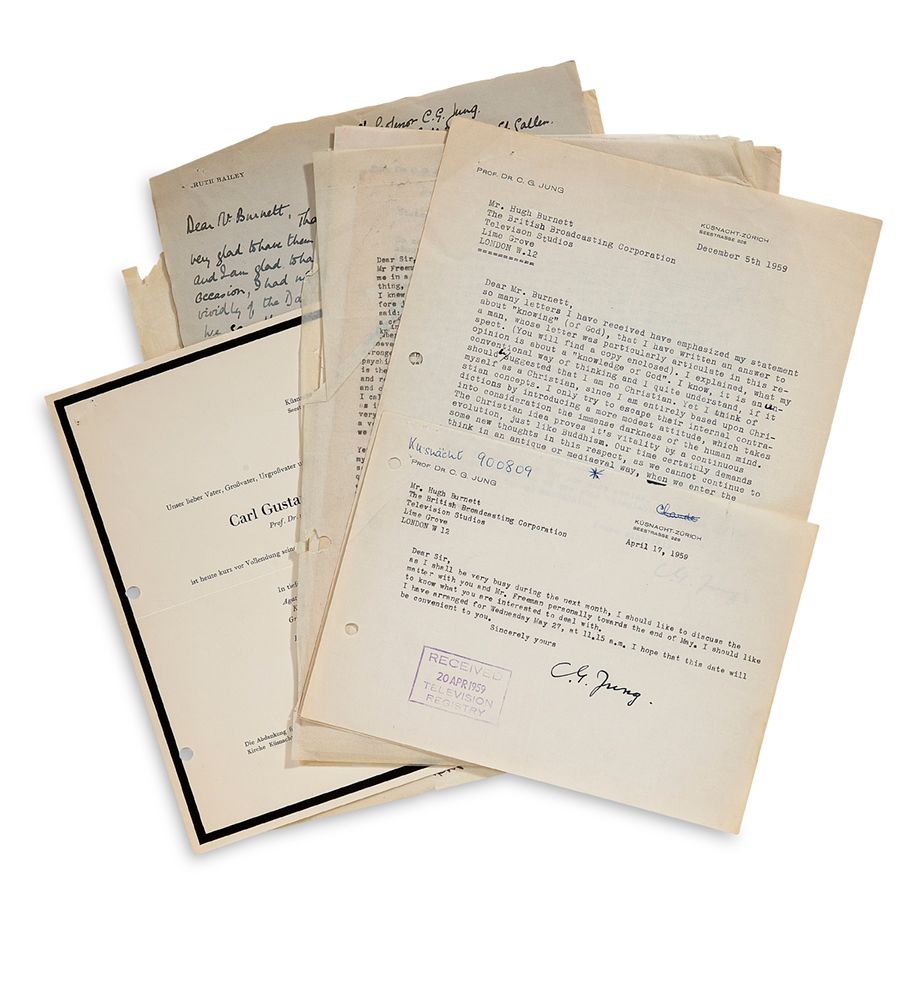Description
JUNG Carl Gustav (1875-1961) psychiatre suisse.
5 L.S. "C.G. Jung," Küsnacht-Zürich 1959-1960, to Hugh BURNETT; 4 1/2 pages in-4 and 1 oblong page in-8 typewritten on his letterhead, one envelope (binder holes); in English. Interesting correspondence about his BBC radio broadcasts. Addressed to Hugh BURNETT, producer of the BBC program Face to Face, where Jung explained his ideas to the general public. 17 April 1959. Jung agreed to meet with Burnett and John Freeman. On November 16, 1959, he expressed his satisfaction at the success of the program but was reluctant to participate again, feeling reluctant to advertise himself so quickly. He is not a politician or a movie star. The answer to popularity is modesty. He doesn't want to impose his presence on viewers again. They might get tired of him and he might get hostile... The impact that the unusual agitation of such a performance can have on him frightens him a little; and he is old... December 5, 1959. He clarifies his thoughts when he spoke in the program about the "knowledge" of God. He knows that this is an unconventional concept, and he fully understands that one may wonder if he is a Christian. Yet he considers himself a Christian, since his thinking is based entirely on Christian concepts. He only tries to escape from the internal contradictions of Christianity, by adopting a more modest attitude, which takes into consideration the vast darkness that reigns in the human soul. The Christian religion has proven its vitality through constant evolution, as has Buddhism. The present time obviously requires new opinions in this regard, because, as far as religious experience is concerned, we cannot continue to think as we did in antiquity or the Middle Ages... He thanks for the photos: it is a personal enrichment to discover undeniable proofs of the stupidity of facial expression... June 30, 1960, he launches into a long explanation of why he does not wish to be interviewed a second time by a so-called professional; he is somewhat suspicious of his colleagues, after too many unfortunate experiences involving misunderstandings and unnecessary prejudices, such as: archetypes are metaphysical ideas, they are mystical, they do not exist; Jung is a philosopher, he has an Electra complex towards Freud and so on... He avoids as much as possible interviews with those of his colleagues who are looking for basic information. He also avoids people who are antagonistic from the start, who only want to listen to their own ideas and not his... He is tired of talking to people who don't even know the basics of psychology... Then he tells the terrible experience of his interview by an American professor... August 5, 1960. He comes back on his great age (85 years) and his health condition; it is time to take a vacation, and to pass the baton to the young generation... Enclosed: the carbon copy of his letter of December 5, intended for another correspondent on the same subject, and a public statement in typescript prepared from it, entitled Statement from Professor Jung; plus 2 L.S. from his secretary Aniela JAFFÉ (1960-1961); a long l.a.s. from Ruth BAILEY (Jan. 10, 1960) about Jung's reactions to the film; a l.s. from William McGuire of Princeton University Press about a proposed edition of these interviews (27.IV.1979); and a double typed reply from Burnett (11.VII.1961); the death notice of Jung; also attached to the above letters,
119
JUNG Carl Gustav (1875-1961) psychiatre suisse.
